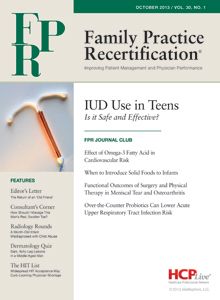Publication
Article
Family Practice Recertification
Over-the-Counter Probiotics Can Lower Acute Upper Respiratory Tract Infection Risk
Author(s):
A systematic review of 14 randomized controlled trials found a probiotic Lactobacillus strain taken daily lowers the risk of acute upper respiratory tract infection (URTI) without increasing the risk of adverse events.
Frank J. Domino, MD
Review
Hao Q, Lu Z, Dong BR, Huang CQ, Wu T. Probiotics for preventing acute upper respiratory tract infections. Cochrane Database Syst Rev. 2011 Sep 7;(9):CD006895. http://onlinelibrary.wiley.com/doi/10.1002/14651858.CD006895.pub2/abstract.
Study Methods
This was a systematic review of 14 randomized controlled trials involving 3,451 patients with acute upper respiratory tract infections (URTIs).
Patient Demographics
Though the trials were diverse in population, they may have contained greater representations of patients from Asian cultures, where the use of probiotics may have more societal acceptance.
Intervention and Control
Probiotic strains were compared to placebo on outcomes that included URTI development, length of illness, and adverse events. Commonly used strains in this study comprised of Lactobacillus acidophilus, L. casei, L. gasseri, L. bulgaricus, L plantarum, L. paracasei, L. rhamnosus, Streptococcus thermophiles, and Bifidobacterium lactis.
Results and Outcomes
Probiotics were superior to placebo in participants who experienced episodes of acute URTI. The odds ratio (OR) to prevent at least 1 URIT was 0.58 [95% confidence interval (CI) 0.36 to 0.92], while the OR to prevent at least 3 episodes was 0.53 (95% CI 0.36 to 0.80). In addition, the reduction in acute URTI episodes from probiotic strains lowered antibiotic prescription rates (OR 0.67; 95% CI 0.45 to 0.98).
However, probiotics didn't alter the mean duration (MD) of an episode of acute URTI versus placebo (MD -0.29; 95% CI -3.71 to 3.13), and the odds of an adverse event occurring didn't differ between the intervention and placebo groups (OR 0.92; 95% CI 0.37 to 2.28).
Side effects of probiotics were minor, with gastrointestinal (GI) symptoms being the most common.
Conclusion
When taken daily, an over-the-counter (OTC) probiotic — typically of a Lactobacillus strain — lowered the risk of URTIs in the general population without increasing the risk of adverse events.
Commentary
This study combined a diverse group of papers with varying quality. Nevertheless, they proved that there is very little cost and risk of adverse events with daily probiotic use, and the benefit of fewer URTIs has significant value. Additionally, the data showed that this effect lowers the risk of URTIs and antibiotic use in children.
Still, there is limited data demonstrating that probiotics may lower antibiotic usage in adults. Even so, 1 study found that the probiotic Lactobacillus reuteri lowered the number of days of sick leave among employed adults1, while another set of data has demonstrated that probiotic use in conjunction with antibiotic use may lower the risk of antibiotic-associated diarrhea2.
Probiotics have been studied in a variety of GI disorders with varying results. Some data has shown that probiotics may lessen the symptoms of irritable bowel syndrome (IBS) and lower the frequency of ulcerative colitis exacerbations. When used prophylactically, probiotics may prevent travelers’ diarrhea, and they may even help improve symptoms in patients with chronic liver disease.
There have been many reports in the press about fecal transplantation for the treatment of conditions such as resistant C. difficile and even obesity, but these areas require further study in order to demonstrate efficacy and safety. Until then, it's safe to recommend the use of Lactobacillus sp. probiotic for the prevention of URTIs in adults.
References
1. Tubelius P, Stan V, Zachrission A. Increasing work-place healthiness with the probiotic Lactobacillus reuteri: A randomised, double-blind placebo-controlled study. Environ Health. 2005 Nov 7;4:25. http://link.springer.com/article/10.1186%2F1476-069X-4-25.
2. Guandalini S. Probiotics for prevention and treatment of diarrhea. J Clin Gastroenterol. 2011 Nov;45 Suppl:S149-53. http://journals.lww.com/jcge/Abstract/2011/11001/Probiotics_for_Prevention_and_Treatment_of.12.aspx.
About the Author
Frank J. Domino, MD, is Professor and Pre-Doctoral Education Director for the Department of Family Medicine and Community Health at the University of Massachusetts Medical School in Worcester, MA. Domino is Editor-in-Chief of the 5-Minute Clinical Consult series (Lippincott Williams & Wilkins). Additionally, he is Co-Author and Editor of the Epocrates LAB database, and author and editor to the MedPearls smartphone app. He presents nationally for the American Academy of Family Medicine and serves as the Family Physician Representative to the Harvard Medical School’s Continuing Education Committee.





